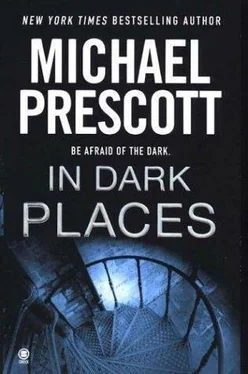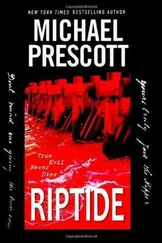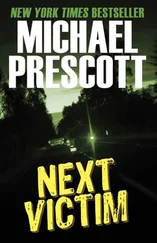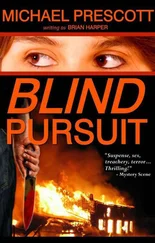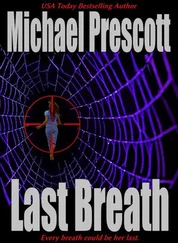He wasn't too thrilled about how things at the arcade had ended. He was pretty sure the doc had kept him talking just to buy time till her police buddies showed up. It was a betrayal, and he didn't like betrayals. He had half a mind to step out of the stairwell and pop her and her boyfriend right now.
Problem was, he recognized the guy's voice too. It was the cop who'd yelled, "Police, freeze," or whatever Jack Lord bullshit he'd been barking. That guy wasn't likely to go down easy. He'd pull out his piece and start busting caps, and all of a sudden the hallway would be the OK Corral. Gray didn't think too highly of his chances in that kind of engagement. He stayed hidden.
The footsteps stopped. "Look at this." The doc's voice. "Door was left unlocked."
"Careless."
"Damn stupid."
The cop laughed. "You can't spell slapdash without LAPD."
Gray had to admit, he kind of liked that one.
When the voices had receded and the door had closed, Gray emerged from the stairwell. He went quickly down the hall to the accountant's office or whatever it was. He hoisted himself through the window, retraced his steps to the fence, and then it was up and over and back to the alley. He cranked the Firebird's engine and reversed into the street.
Alan Brand lived in Hollywood. Gray could be there in twenty minutes.
It was impolite to drop in without calling ahead, but he was sure the sarge would understand.
Robin flicked on the overhead light in her office and took a look around. Her computers, left running after the attack, had powered down automatically to standby mode after an hour of inactivity. The MBI appliance was on the floor where Gray must have tossed it after unbuckling himself from the chair. She was glad the police hadn't confiscated the unit. She only hoped it hadn't been damaged in the fall.
"There's a kitchenette to your left," she told Wolper as she picked up the appliance. "You can fix yourself a cup of coffee if you like."
"I'd rather just get started."
"So would I, but the preparations may take a while."
Behind her, he entered the kitchen area. The small TV in the kitchen clicked on, and an announcer's voice told viewers to stay tuned for the ten-o'clock news.
She hadn't realized it was so late. Meg had been missing for nearly six hours.
Sitting in her swivel chair, she awakened the computers and turned on the appliance. She would have to run the diagnostics program to be sure that the ferromagnetic coils were working and were in the proper alignment. The program would take about fifteen minutes.
While it ran, she scrounged around on the floor for the two headset transceivers. The one she'd worn was all right, but Gray's headset had been broken when he had cast it aside. She had no replacement. She and Wolper would just have to talk over the loud clicking of the coils.
The electrodes attached to Gray's body had also been strewn everywhere in a tangle of wires. She swept them aside. There was no point in wearing the electrodes anyway. Wolper wouldn't be able to decipher the readouts.
On the TV news, the top story was under way: the ongoing manhunt for serial killer Justin Hanover Gray. Her name and Meg's had been kept out of the report. Gray was said to have attacked a psychiatrist working with him, killed a deputy, and kidnapped a teenage girl whose photo had been provided to the media.
She tuned out the news and considered the challenge of recovering her memory of the attack.
She was suffering from traumatic retrograde amnesia. No one really understood how memory worked, but most theories assumed that short-term memory had to be processed by the hippocampus, part of the brain's medial temporal lobe. A sudden shock to the brain, such as the blunt trauma that had produced her concussion, seemed to disrupt the electrical activity in the hippocampus and somehow prevented the short-term memory from being transferred to long-term storage. The memory most likely to be lost was that of the trauma itself.
The question was whether or not the memory still existed. If it did, and the problem was one of retrieval, then the MBI procedure might bring it to the surface in the same way that it liberated long-suppressed memories of childhood abuse and other traumas. But if the memory was simply gone, then nothing could reclaim it.
She was reasonably optimistic about retrieval. Most victims of concussion eventually recovered some memories of the event. How these memories were stored and how they were regained were two of the countless mysteries of the brain. Some experts postulated a dual storage mechanisma kind of backup memory system that kept working even when the hippocampus failed. Other experts believed that hippocampal processing was only delayed by trauma, not prevented, and that even a short-term memory remained intact somewhere in the temporal lobe, ready to be consolidated into long-term storage when normal memory function resumed.
Nobody knew. When it came to the brain, what was known was vastly outweighed by what was unknown.
She decided to boost the output of the coils affecting both temporal lobesthe left, which processed memories of names and words, and the right, which handled memories of faces and other visual information. A strong low-frequency magnetic field over those areas would inhibit their activity and perhaps allow the relevant neural mechanisms to settle down and begin functioning normally after the agitation of the trauma.
The TV report was wrapping up as a reporter, live at the Hollywood cul-de-sac, repeated word of the failed pursuit. In midsentence he went silent. Wolper had turned off the set. He emerged from the kitchenette, carrying a mug of coffee.
"Hammond must be just loving this," he said.
His jocular tone infuriated her. "I don't give a damn about your office politics." She took a breath. That hadn't been smart or fair. "Sorry. I'm just amp; all wound up."
He came closer. "Do you really think you should be doing this right now?"
"I have to do this. Right now."
"Will it work?"
She sighed. This was the fourth or fifth time he'd asked. "I don't know. Let me work out the technical stuff, okay?"
Wolper drifted away. Robin concentrated on reprogramming the appliance's parameters. When she was finished, she checked the diagnostic results. All fifty-two coils were functioning normally. She exhaled a breath of relief.
"All right, I think we're ready to start."
Wolper joined her again at the computer console.
"Once I'm wearing the appliance," she said, "all you have to do is press the enter key. That will activate the appliance. I'll go into a trance. It should take five minutes or so. You'll see me getting relaxed."
She thought about telling him that she should not be allowed to stay under for more than thirty minutes, because the procedure's safety over longer time intervals had never been verified. She decided against it, not wishing to be pulled out just as she was on the verge of a breakthrough. She would remain in an altered state of consciousness for as long as it took.
"The MBI will be noisy. It makes a loud clicking sound. That's normal. Don't let it worry you."
"Why should I be worried? You're the one who'll be wearing this gizmo."
Robin didn't care for the term gizmo , but she let it ride.
"So what am I supposed to do," he asked, "besides watch you get your brain scrambled?"
"Your job is to ask me questions, the way you did in the interview room. Pretend you're taking a statement. Lead me through the events preceding the attack. My answers may be slow. It'll be like I'm on drugs or something."
"I've done a few interviews with drugged-up witnesses."
"There should be a point when I'm in position to see the assailant. That's the memory I need to recover."
Читать дальше
